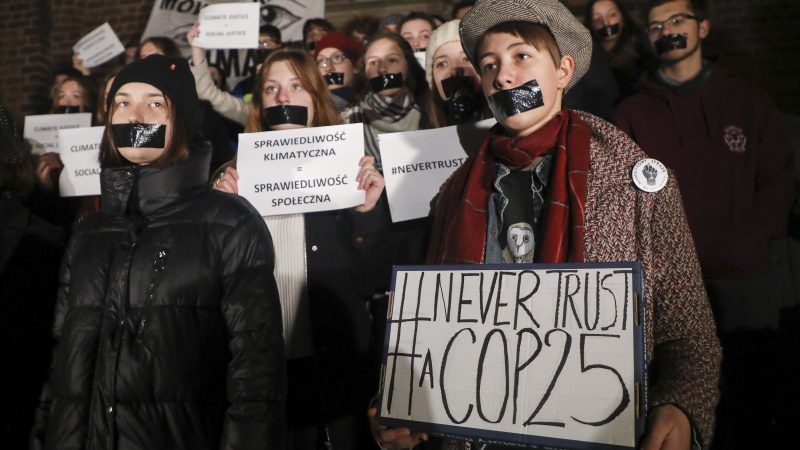Activists Denounce Madrid Climate Change Conference Outcomes as 'Totally Unacceptable' and 'Deeply Flawed'
COP25 whimpers to its inconclusive close.

It dragged on longer than any previous United Nations climate change conference, but for most climate activists the 25th Conference of the Parties (COP25) to the United Nations Framework Convention on Climate Change was a near-total failure. Specifically, negotiators from more than 190 states meeting in Madrid, Spain, failed to work out how to track and account for carbon dioxide emissions trading between countries and declined to meet poor nations' demands for what amounts to climate reparations from rich nations. In addition, some big carbon emitters—China, the United States, India, Russia—refused to meet activist demands that they commit to deeper emissions cuts.
"Governments need to completely rethink how they do this, because the outcome of COP25 is totally unacceptable," declared Greenpeace executive Jennifer Morgan in a roundup of activist statements. "At a time when the science and the urgent need to address the human toll of climate impacts couldn't be clearer, the deeply flawed outcome here in Madrid is plainly unjust and immoral," added Rachel Cleetus of the Union of Concerned Scientists.
"The global climate talks are a farce if countries continue down this destructive path of inaction," concluded Jean Su of the Center for Biological Diversity. Chema Vera of Oxfam International agreed: "The world is screaming out for climate action but this summit has responded with a whisper."
Basically concurring with the activists' assessment, United Nations Secretary-General António Guterres declared himself "disappointed with the results." He further vowed, "I will not give up. I am more determined than ever to work for 2020 to be the year in which all countries commit to do what science tells us is necessary to reach carbon neutrality in 2050 and a no more than 1.5 degree temperature rise."
You can see why the activists were upset. For one thing, the meeting's rich countries refused to set up a scheme that would pay poor countries for the "loss and damage" stemming from climate change. Also, activists they wanted all the signatories to the Paris Agreement on climate change to increase the amounts by which they were pledging to reduce their greenhouse emissions. That did not happen. The U.S. is scheduled to officially withdraw from the Paris Agreement next November, and both China and India refused change their climate commitments, which run until 2030.
Another major sticking point was how to establish rules for an international carbon market, an idea embedded in Article 6 of the Paris Agreement. One point of contention involves when governments or foreign private companies pay for carbon dioxide emissions to be reduced in another country. For example, a power plant in Germany might pay either the government of Brazil or a local landowner to keep forests standing in order to absorb carbon dioxide. The problem is that Germany and Brazil both want to count the same emissions reductions derived from the forests toward their national targets. But only one should be allowed to claim it, unless you want to unleash a lot of double counting.
Another Article 6 problem is what to do with the emissions credits earned through the Clean Development Mechanism under the failed Kyoto Protocol. Under that agreement, companies in rich countries met their emissions reductions goals by financing low-carbon and no-carbon projects in poorer countries. Opponents argue against counting these old credits for billions of tons of emissions reductions, on the grounds that they would flood the new markets, greatly discouraging investment in further reductions. Holders of the credits respond that their good-faith investments in Kyoto Protocol emission reduction projects should not be rendered worthless.
So just I predicted last week, COP25 ended with diplomatic equivocation and obfuscation. These thorny issues were kicked down the road to be debated again next November, at the COP26 conference in Glasgow, Scotland.


Show Comments (65)